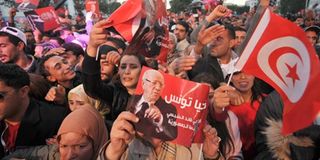Tunisia votes in presidential runoff as African polls close

Supporters of Tunisian presidential candidate on the anti-Islamist Nidaa Tounes party ticket Beji Caid Essebsi attend his last meeting on December 19, 2014 at Avenue Bourguiba in Tunis. Tunisians voted today in the runoff of the country’s first free presidential election, with authorities urging a big turnout to answer efforts to disrupt the final leg of a four-year transition. PHOTO | FETHI BELAID |
What you need to know:
- The poll’s first round came nearly a month after legislative elections held on October 26, resulting in the perceived emergence of two opposing camps that are dominant on the Tunisian political scene.
- The two camps comprise the Nidaa Tunis (“Tunisian Call”) party, which claimed 86 seats, and the runner-up Ennahda Islamist party, which managed to clinch 69 seats even as later developments during the first round of presidential polls set the stage for today’s decisive runoff.
- As for incumbent president Marzouki, a physician, he is renowned as a human rights activist and long-time dissident who today enjoys wide support from the country’s Islamists.
Practically rounding up a particularly momentous year in African governance, Tunisia holds the crucial runoff Sunday of the presidential poll first held last November 22.
The poll’s first round came nearly a month after legislative elections held on October 26, resulting in the perceived emergence of two opposing camps that are dominant on the Tunisian political scene, and which won more than two thirds of the parliamentary seats.
The two camps comprise the Nidaa Tunis (“Tunisian Call”) party, which claimed 86 seats, and the runner-up Ennahda Islamist party, which managed to clinch 69 seats even as later developments during the first round of presidential polls set the stage for today’s decisive runoff.
The yet unconcluded balloting is widely viewed as a landmark event, being the first democratic presidential election since Tunisia became the epicentre of the Arab Spring with a cataclysmic revolt that brought down the allegedly corrupt and autocratic government of former president Zine el-Abidine Ben Ali.
CONCEDED DEFEAT
Incidentally, Sunday's runoff comes exactly a week after Mauritius President Rajkeswur Purryag, whose position is mostly ceremonial, last Sunday appointed opposition leader and ex-president Anerood Jugnauth as the new prime minister.
The swift appointment came after the outgoing prime minister, Navin Chandra Ramgoolam, gracefully accepted defeat following recently concluded parliamentary elections that were deemed among the most crucial ones in Mauritius since the country gained independence from Britain in 1968.
A major point of contention before the elections was a robust debate over constitutional reform. Sparked by a potentially divisive proposal to strengthen presidential powers, the debate was crucial in the polls, during which voters rejected government plans to expand those powers.
Surprisingly for some, the Mauritian voters instead handed the centre-right Alliance coalition, styled Leep, a landslide opposition victory, a rare occurrence in African countries that the incumbent prime minister Ramgoolam however took in his stride.
“The electorate has made its choice [and] I humbly accept its decision,” he said civilly after losing the polls. “I will now meet the President of the Republic to submit my resignation.”
EPIC MILESTONE
Back to Tunisia, Sunday’s presidential runoff is an epic event given the crises the country has faced in the past.
They include that of mid-2013, when two so-called martyrs from the Popular Front—Mohammed Brahimi, the leader of the Popular Movement, and Chokri Belaid, leader of the Democratic Nationalist Party — were assassinated.
In the meantime, soon after the October 26 parliamentary polls, observers were quick to note that the majority of Tunisia’s apparently disillusioned youth did not bother to vote.
Even more alarmingly, amid few signs of badly-needed generational change, youth unemployment in the country reportedly stands at about 30 percent and is a veritable time bomb. Tellingly, jobless youth were a major force in fuelling the uprising against Mr Ben Ali.
Such realities aside, today’s political duel is widely viewed as one between the two main blocs in the current Tunisian Parliament, namely Mr Beji Caid Essebsi’s centrist Nidaa Tounes party and the main Islamist party, Ennahda.
Incidentally, the latter did not put forward its own candidate for the presidency, just as it did not openly endorse a candidate.
ENJOYING GREAT SUPPORT
Regarding last month’s presidential poll first round, only six percentage points separated frontrunner Essebsi, 88, from former dissident and incumbent president Moncef Marzouki, 69.
As matters turned out, Mr Essebsi won 39.5 percent of the vote, ahead of Mr Marzouki, who garnered 33.4 per cent of the ballots.
Viewed in some quarters as a voice from the country’s troubled past, Mr Essebsi held prominent positions under two former Tunisian rulers, Presidents Habib Bourguiba and Ben Ali.
Not surprisingly, some of his opponents have accused him of seeking to bring back the old ruling establishment that was overthrown in the popular uprising nearly four years ago.
As for incumbent president Marzouki, a physician, he is renowned as a human rights activist and long-time dissident who today enjoys wide support from the country’s Islamists.
What is more, unlike Mr Essebsi, his opponent and political nemesis, Mr Marzouki is also regarded as a true revolutionary who vociferously opposed the authoritarian governments of former presidents Bourguiba and his successor Ben Ali.





